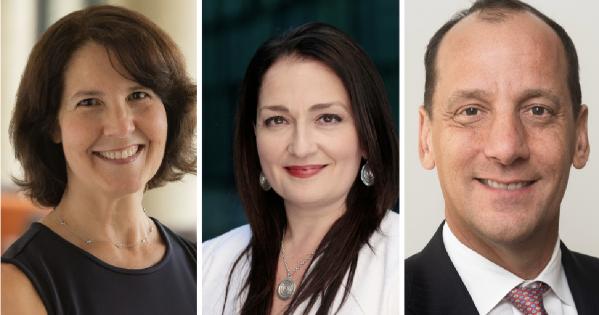AU’s Newest Deans Share Thoughts from Their Semester and Plans for the Future

David Marchick, the new dean of the Kogod School of Business, recently joined students for a hike on the Billy Goat Trail near Great Falls in the Chesapeake and Ohio Canal National Historical Park.
Shannon Hader, who took the helm at the School of International Service in July, met with nearly all of the college’s faculty and staff, coming away with a deep appreciation for the work they’ve accomplished. “[With all of the] brainpower and professional experience that folks bring to the table, this work is like being a kid in a candy shop,” she said.
And Dean Linda Aldoory, who joined the College of Arts and Sciences this summer, hosted meet-and-greets with students, spending hours chatting with them.
For each of the three new deans, engaging with enthusiastic members of the AU community has been among the highlights of their first semester. “It has been just amazing,” Aldoory said. “I can’t get over the energy, the engagement, the emotionality, or the excitement.”
All three deans started within a month of each other and had to quickly adapt to their new roles. Aldoory comes from academia, while Hader and Marchick spent much of their careers in international organizations, business, and government. Their diverse backgrounds have eased the transition and helped shape their visions for their schools.
Aldoory brings to AU’s largest and most diverse college years of experience as an associate dean, professor, and center director at the University of Maryland. Marchick comes to Kogod after 12 years as managing director of the Carlyle Group. He also served as director of the Center for Presidential Transition at the Partnership for Public Service during Joe Biden’s presidential transition and worked in two presidential administrations. Hader—the first medical doctor to lead SIS—brings experience building transnational coalitions as the former assistant secretary-general of the United Nations and deputy executive director of programmes at the Joint United Nations Programme on HIV/AIDS.
Marchick called his first three months at AU “exhilarating, interesting, and rewarding.” He’ll focus on being an enabler and a cheerleader, recruiting and retaining faculty, and supporting and encouraging students. Marchick’s leadership style focuses on strategy, resources, and people, and his goal is to invest in and amplify Kogod’s strengths.
“I’m finding pockets of strength I didn’t even know existed,” he said.
Marchick’s priorities include building a world-class sustainability program, promoting Kogod’s strengths in analytics, and nurturing the school’s work in entrepreneurship and innovation.
Aldoory goals—rooted in AU’s strategic plan—include advancing student and faculty diversity and retention, and focusing on issues of safety, security, health, and sustainability. She plans to implement “office hours,” launch a virtual suggestion box, and find new ways to reach all of the college’s constituents.
“I embrace the diversity of content areas in CAS,” said Aldoory, who leads a team of 19 different faculty chairs. ‘I'm challenged by it. I'm invigorated by it.”
Hader is focused on forging partnerships with global institutions from foundations to think tanks to government entities to private sector, to bolster opportunities for students and faculty to drive cutting-edge solutions. She wants to continue to push the school forward on its mission to wage peace and learn what is and what isn’t working for members of the SIS community. She will help SIS strengthen its research enterprise and offer new events like Ambassadors Up Close to engage students, and re-engage alumni worldwide.
“One thing that makes SIS so special is our ability to influence the world through [our] students and our thought leadership, and by making sure our leadership finds it its way to the tables of power,” Hader said.
